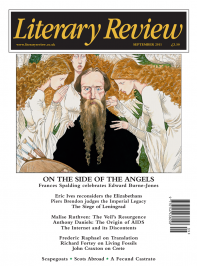Peyton Skipwith
Dreamer in Cretan Landscape
John Craxton
By Ian Collins
Lund Humphries 184pp £35
Ian Collins quotes John Craxton as saying, ‘I love sailors and hate navies, love soldiers and hate armies.’ It is a typically provocative Craxton remark and was undoubtedly said with amused anticipation as he awaited his interlocutor’s response – his impish sense of humour got him into trouble on more than one occasion. Soldiers and sailors recur in a number of Craxton’s most memorable Cretan canvases, but always off duty: we find them seated around a restaurant table in the much reworked Still Life with Three Sailors (1980–5), casually relaxed as in Fusilier Eating Yoghurt (1976), Soldier with Slivovitz (mid-1990s) and Soldier by the Sea (1985), or just daydreaming. The recumbent sailor spread-eagled on the ground, eyes closed, in Goat, Sailor and Asphodels from the mid-1980s is in many ways a summation of Craxton’s aesthetic, linking his English roots to his beloved Crete. The English poetic tradition, as Collins points out, associated the beautiful flower of the asphodel with the Elysian Fields, but for Craxton, steeped in classical mythology, the Asphodel Meadows of the Ancient Greek underworld were the preserve of ordinary humanity. It was there among simple folk that he found his deepest muse and dreamed of spending eternity. He divided his life between England and Greece. He loved London but revelled in the sunshine and simplicity of the Aegean, responding to the people, the landscape, stray cats and simple food, as the joyous evidence of many sun-drenched paintings bears out.
For many years Craxton held would-be biographers at bay, relenting only the year before he died, and then only on the strict condition that he could dictate the terms. From their first meeting at Prunella Clough’s memorial service Collins was a regular visitor to Craxton’s Hampstead studio, but

Sign Up to our newsletter
Receive free articles, highlights from the archive, news, details of prizes, and much more.@Lit_Review
Follow Literary Review on Twitter
Twitter Feed
Few writers have been so eagerly mythologised as Katherine Mansfield. The short, brilliant life, the doomed love affairs, the sickly genius have together blurred the woman behind the work.
Sophie Oliver looks to Mansfield's stories for answers.
Sophie Oliver - Restless Soul
Sophie Oliver: Restless Soul - Katherine Mansfield: A Hidden Life by Gerri Kimber
literaryreview.co.uk
Literary Review is seeking an editorial intern.
Though Jean-Michel Basquiat was a sensation in his lifetime, it was thirty years after his death that one of his pieces fetched a record price of $110.5 million.
Stephen Smith explores the artist's starry afterlife.
Stephen Smith - Paint Fast, Die Young
Stephen Smith: Paint Fast, Die Young - Jean-Michel Basquiat: The Making of an Icon by Doug Woodham
literaryreview.co.uk